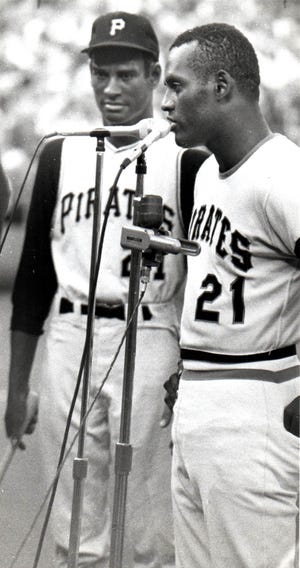Baseball, American history isn't complete without Roberto Clemente's story

The start of the Major League Baseball season is a time when we collectively exhale because it means that spring has begun in earnest.
In hopes of re-igniting fan interest, the league has implemented a "pitch clock" to speed up a game in dire need of it. The America of 2023 is made up of people who have neither the time nor the inclination to watch a 10-minute turn at bat.
Because baseball is a game which trades heavily in nostalgia, there's something sad about a Florida school district's decision to temporarily remove a book about Pittsburgh Pirates star Roberto Clemente from its shelves because it includes accounts of his experience with discrimination.
Baseball is America's mirror Contrary to laments about politics, baseball often reflects where we are
Last month, “Roberto Clemente: Pride of the Pittsburgh Pirates” by Jonah Winter and illustrated by Raúl Colón was among the more than 1.5 million books pulled from the shelves of public schools in Duval County, Florida, in compliance with the state's Stop Woke Act, which restricts how gender and race are discussed in schools and businesses.
The book has since been reinstated, most likely out of sheer embarrassment.
Half-told history
But the smoke is out of the bottle. The New York Times recently reported that, in order to comply with the Florida law, a book publisher in New York produced a draft which removed all references as to why Rosa Parks was ordered to sit in the back of the bus.
What's next, federal marshals walked Ruby Bridges to school to make sure she wouldn't get lost?
Half-told history benefits no one. While it's true that history is sometimes uncomfortable, even tragic, eliminating negative narratives threatens to send children into the world ignorant of the events which are part of the ongoing saga that is their country.
Here's the thing: Stories about discrimination in America almost always contain an addendum of how change occurred as a result of it. Our innate desire to correct our mistakes is the essence of what makes us so unique.
Every parent in America should aspire for his or her child to be like Roberto Clemente. Born in poverty in Puerto Rico, he died in a plane crash while on a relief mission to Nicaragua on New Year's Eve in 1972. In addition to being one of the greatest ever to play the game, he was the quintessential humanitarian and an example of how fame and fortune can and should be used to help others.

Besides all this, kids aren't stupid. They're much more astute and resilient than some of the adults who are trying to shield them from inconvenient truths.
Last month, the Tallahassee Democrat reported that a charter school which boasts a classical curriculum — I kid you not — fired its principal after three parents raised hell about sixth graders being shown an image of Michaelangelo's "David" sculpture.
This is the kind of cultural cluelessness that threatens to cripple us.
Book bans do more harm than good: The trouble with Anne Frank
Sex, lies, and murder
Now, it would be disingenuous to pretend that every book is appropriate for all children, including even some supposedly written for kids. This, unfortunately, has become a toehold for bans fueled by fear and demagoguery.
A book about Clemente does not qualify for such concern. We must suppose that if we look hard enough, issues could be found with "Green Eggs & Ham," "Hansel and Gretel," or the entirety of 2 Samuel, an eye-popping biblical tome of sex, lies and murder.
According to the American Library Association, book ban attempts reached an all-time high last year. Some of the perennials include "To Kill a Mockingbird," "Of Mice and Men," "Catcher in the Rye," "Lord of the Flies," "Huckleberry Finn," "The Color Purple" and "Are You There God? It's Me, Margaret."
Both conservative Christians and trans activists are boycotting "Harry Potter" author J.K. Rowling — no easy feat.
Perhaps it's just a coincidence that bans and challenges of books about Anne Frank, Elie Wiesel, Hank Aaron and the Rev. Martin Luther King Jr. also happen to be stories about change in the face of resistance and criticism.
This country, which appears to be in the throes of an identity crisis, needs more books about such people, not fewer.
In Major League Baseball, fan giveaways are part-and-parcel of attending a game. On May 2, 3 and 4, the Pirates play the Rays in Tampa. Instead of a bobblehead, or some cheap foam finger made in China, wouldn't it be something if the teams went in together and gave away copies of "Roberto Clemente: Pride of the Pittsburgh Pirates” to every family who attended?
Charita M. Goshay is a Canton Repository staff writer and member of the editorial board. Reach her at 330-580-8313 or charita.goshay@cantonrep.com. On Twitter: @cgoshayREP